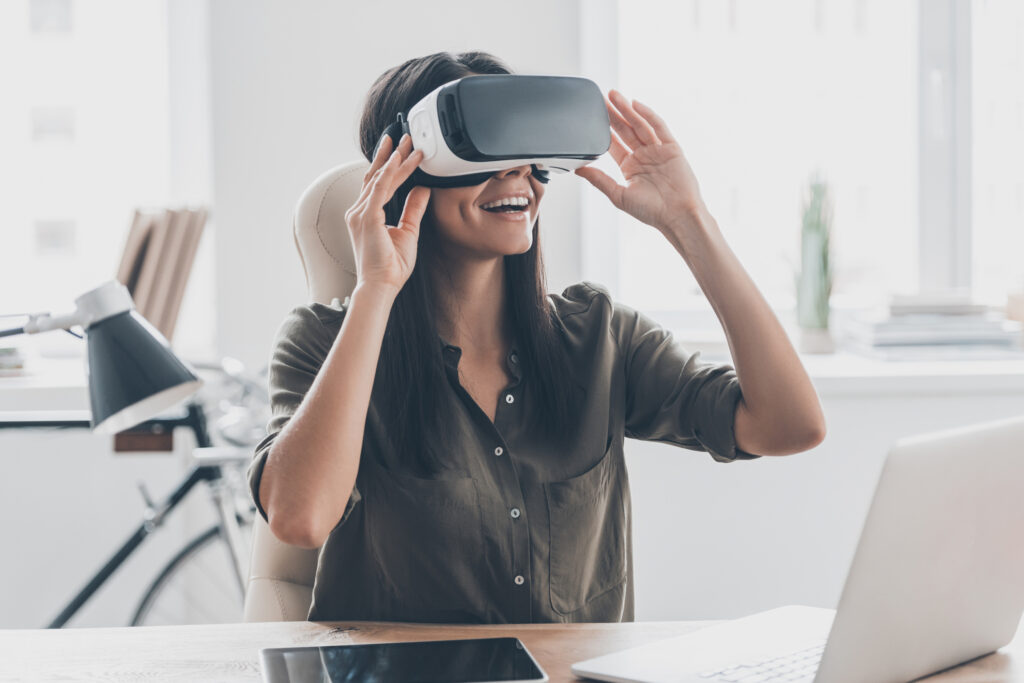Krutz offered a group of business owners and entrepreneurs suggestions on how to employ the technology — from immersive interactive environments for real estate professionals to digital overlays of physical reality — during a recent Louisiana Technology Park Academy seminar.
“VR is just another communication tool, so don’t let it intimidate you,” Krutz says. “It’s just a medium that nobody really knows how to deploy yet, but there’s going to be applications for just about anything.”
A native of Louisiana and a graduate of the University of New Orleans, Krutz began his career in the visual effects industry as a compositor and 3D generalist. After working on film series such as “Harry Potter” and “The Chronicles of Narnia,” he transitioned to the world of VR and “augmented reality” development.
Driven largely by the gaming sector, the virtual reality industry has grown into a multibillion-dollar enterprise, with analysts projecting that 90 million VR headsets will be sold by 2020 as adoption spreads.
Krutz says widespread growth will create increased demand for content — and in turn offer opportunities for small businesses across numerous sectors. The emergence of cheaper camera technologies and user-friendly development tools like Vuforia and Unity makes it easier than ever to jump into the VR space.
Enhancing Reality
Augmented reality refers to software that takes in information in the physical world and gives users feedback about their surroundings via technology. The most popular example of AR is “Pokémon Go,” the wildly successful mobile game that lets users track and view animated characters on real-world landscapes through their digital devices.
But AR is not limited to the world of games. Krutz demonstrated an application he developed for an engineering company to enhance a paper brochure the firm produced to promote its construction of offshore platforms.
When users view the paper brochure through a mobile phone or tablet, a 3D animated model shows how the platforms are constructed. Krutz says the animation helped the company more effectively communicate how the structures are built than a static piece of paper can.
Krutz says real estate developers could use AR to digitally show a completed structure on a vacant plot of land. Prospective investors or tenants visiting a site could view the land through a device and instantly see buildings spring up and come to life.
Immersive Environments
On the far end of the VR spectrum are fully immersive virtual environments, usually viewed through a specialized headset like the Oculus Rift.
Krutz says businesses can use VR as a recruitment tool for new talent, offering a virtual guided tour through their office to prospective employees. Offshore or refinery workers can familiarize themselves with facilities long before ever visiting the actual work site, and cities can offer interactive tours of their urban landscapes to attract visitors.
Real estate companies have been among the earliest non-gaming adopters of VR technology, Krutz says, creating digital environments to showcase properties to potential buyers.
“It’s a really cool, interactive way to introduce someone to a new city, a house or anything like that,” he says.
Challenges remain for businesses looking to adopt the technology, Krutz says. Developers must take care to consider the user’s attention and perspective when crafting content, and motion must be used judiciously to minimize the risk of nausea.
Another challenge is varying standards in the VR industry, which Krutz compares to the early days of DVDs, when companies produced dueling technology standards and competed against each other for consumer adoption. “Once it standardizes it will be a much better and stable platform,” he says.
About Tech Park Academy
Tech Park Academy is a monthly seminar hosted by the Louisiana Technology Park. We strive to bring you talented, knowledgeable professionals who have invaluable information to share. These events are accompanied by a catered lunch, which is included in the ticket price of $10. Sign up for the next event.



